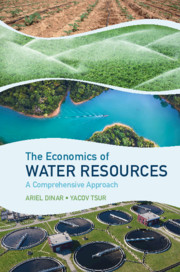Book contents
- The Economics of Water Resources
- The Economics of Water Resources
- Copyright page
- Contents
- Figures
- Tables
- Acknowledgments
- Introduction and Outlook
- Chapter 1 The State of Water Resources and the Need for a Comprehensive Perspective
- Chapter 2 The Water Economy
- Chapter 3 Supply Costs, Demands and Benefits
- Chapter 4 Optimal Water Policy
- Chapter 5 Water Regulation
- Chapter 6 Accounting for Uncertain Water Supplies
- Chapter 7 Case Studies of Regulatory Interventions
- Chapter 8 Economy-Wide Considerations of Water Management
- Chapter 9 Management of Transboundary Waters
- Index
- References
Chapter 3 - Supply Costs, Demands and Benefits
Published online by Cambridge University Press: 21 April 2021
- The Economics of Water Resources
- The Economics of Water Resources
- Copyright page
- Contents
- Figures
- Tables
- Acknowledgments
- Introduction and Outlook
- Chapter 1 The State of Water Resources and the Need for a Comprehensive Perspective
- Chapter 2 The Water Economy
- Chapter 3 Supply Costs, Demands and Benefits
- Chapter 4 Optimal Water Policy
- Chapter 5 Water Regulation
- Chapter 6 Accounting for Uncertain Water Supplies
- Chapter 7 Case Studies of Regulatory Interventions
- Chapter 8 Economy-Wide Considerations of Water Management
- Chapter 9 Management of Transboundary Waters
- Index
- References
Summary
This short chapter identifies the ingredients needed to evaluate water policies. It specifies costs and benefits associated with water allocation and the ensuing welfare indices. The chapter discusses the benchmark against which various aspects of performance of the water economy (including the environment) will be evaluated in the following chapters. Benefits include not only those directly realized by consumers or suppliers but also those associated with external effects of water, e.g., ecosystem services.
Keywords
- Type
- Chapter
- Information
- The Economics of Water ResourcesA Comprehensive Approach, pp. 64 - 74Publisher: Cambridge University PressPrint publication year: 2021

